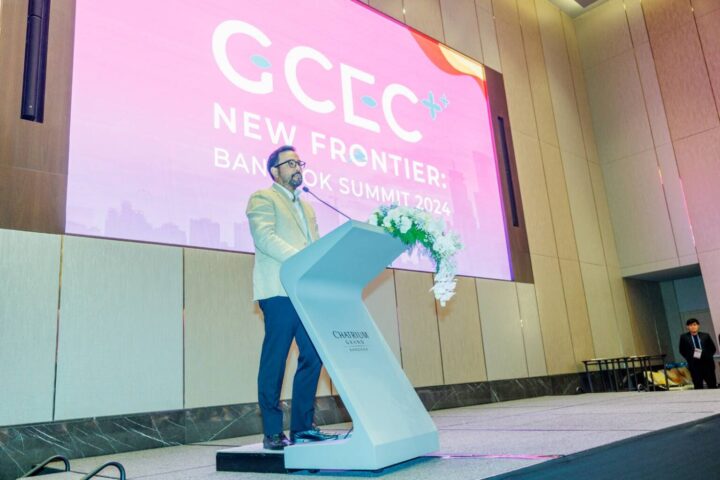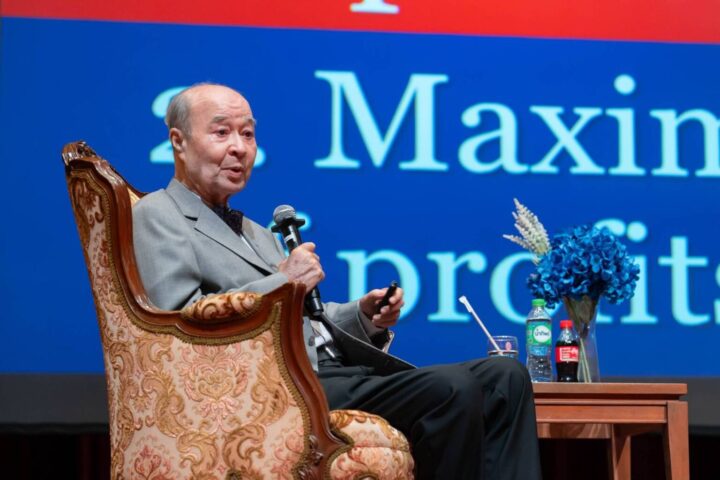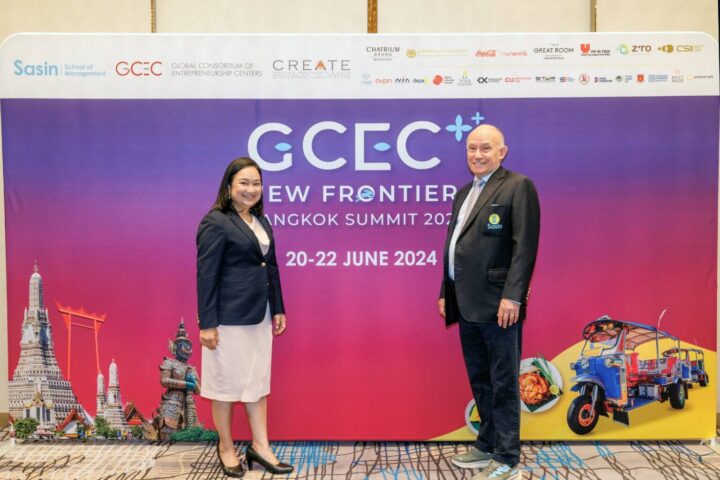, Chulalongkorn University, and the recently hosted the “,” the first GCEC summit in Asia. The summit was the main event at the . Sasin as well as Chulalongkorn University executives delivered welcome and opening remarks, followed by a special talk and discussion on “Driving Inclusive Entrepreneurship Ecosystems for Impact: Journey for Success.”
M.L. Dispanadda Diskul, CEO of the and President of the , gave a talk on “The Power of Change of Entrepreneurs for Society,” citing the work of the Mae Fah Luang Foundation as a pioneer of numerous sustainable development projects in Thailand, Indonesia, Afghanistan, and Myanmar. Particularly noteworthy is the , which has transformed communities once dependent on opium cultivation to forest restoration and alternative crops like coffee. This has led to the expansion of businesses in various sectors such as cafes, tourism, handicrafts, and horticulture, eventually collaborating with global brands like Ikea and Japan Airlines. These notable stories emphasize that collaboration is at the heart of the foundation. New innovative products, such as handwoven fabrics made from recycled PET plastic bottles, also demonstrate the foundation’s sincere commitment to sustainable development.
“We have the technology and knowledge to solve crises, but what we still lack is a global commitment to take action. Although social enterprises play an important role, they are still considered a small business group. The challenge now is how to make large business organizations interested in integrating practices that create positive impact into their business operations. We are determined to show people that businesses can change the world by encouraging large companies, not just in Thailand, to adopt sustainability principles,” said M.L. Dispanadda.

CEO, Mae Fah Luang Foundation and
President, Sasin Alumni Association
Mr. Mechai Viravaidya, former senator, social activist, and founder and President of the and shared with the audience an inspiring story about the efforts of the Population and Community Development Association in driving social enterprises. Since 1975, the association has raised funds and invested in developing businesses that promote rural development without distributing profits back to shareholders. Instead, the profits have been reinvested in education, conservation, livelihoods, and charitable activities. Interestingly, the association attracts investors despite not offering profits as an incentive; however, it guarantees that the capital will definitely yield results. Specifically, the association will plant a tree for every 100 baht of investment. Currently, the association’s social enterprises, such as restaurants, souvenir shops, local produce stores, hotels, resorts, and scholarship programs, all help improve community living standards.
Mr. Mechai emphasized the significance of establishing Mechai Bamboo School, which is dedicated to training social entrepreneurs and new and future community development leaders. The school is not only a school for students, but a center for developing the well-being of the entire community. Parents pay for their children’s tuition by planting trees, and students manage the school’s assets and finances, as well as interview applicants for teaching positions and the principal role.

Former Senator, Social Activist, and Founder and President of the Population and Community Development Association and Mechai Bamboo School
Prof. Dr. Ian Fenwick, Director of Sasin, reiterated Sasin’s mission to inspire, connect, and transform for a better, smarter, and more sustainable world. Over four decades ago, Sasin was established through a collaboration between Chulalongkorn University, the , and . Sasin was the first business school in Thailand to receive international accreditation from and . Today, Sasin continues to expand its collaborations with leading universities worldwide.
“In today’s world, there are endless things to learn, and even if you could learn everything about the world today, by tomorrow that knowledge would already be outdated. What we need to do is inspire people to continuously seek new knowledge and connect them with like-minded individuals to create the power to change businesses, change the world, and change society. And one crucial component of this change is entrepreneurial skills,” stated the Sasin Director.

Mr. Dibyendu Bose, Deputy Director for Strategy, Innovation, and Development of Sasin School of Management, spoke of the goal of Sasin IEW to promote innovation, openness, and positive change that, “We are creating a vibrant hub, platform, and ecosystem where entrepreneurs, startups, investors, policymakers, and even the general public can come together to spark innovation, create an open society, and drive positive change. We have organized many exciting events at Sasin IEW, including the GCEC NEW FRONTIER: BANGKOK SUMMIT 2024, which will delve into how entrepreneurial skills can empower society and business.”
Mr. Dibyendu concluded by thanking the partners, namely the Thailand’s Moral and Good Governance Association, ., Chatrium Grand Bangkok Hotel, the under Royal Patronage, Coca-Cola, , ., The Great Room, , ., and Chulalongkorn University.
Mr. Lars Svensson, Director of the Sasin Sustainability & Entrepreneurship Center (SasinSEC), said that the first day of the conference coincides with the summer solstice, which has the longest daytime in the year, and also a midsummer festival celebration in Sweden.
“We gather here to nurture our collaboration, to celebrate the light of positive thinking, to expand our network, and to embrace our strong love and belief that open entrepreneurship can truly drive positive impact,” stated Mr. Svensson.
Ms. Holly DeArmond, Managing Director of Global Consortium of Entrepreneurship Centers (GCEC), expressed admiration for Bangkok as the first host city for the GCEC summit in Southeast Asia, describing it as a vibrant city, beautiful in culture, and delightful with exquisite cuisine, which has impressed participants experiencing Thailand for the first time. She also spoke about the global expansion of GCEC, which currently consists of 650 members from over 360 institutions worldwide.
“This conference expands our membership to cover regions outside of North America and Western Europe, which is important to our growth strategy. This summit has also introduced GCEC to new markets,” commented Ms. DeArmond.
Ms. Lori van Dam, CEO of , addressed the significance of the 17th SDG, which focuses on “Partnerships” and the role of the summit in nurturing a global ecosystem for social entrepreneurs. Ms. van Dam emphasized the role in preparing young leaders with necessary skills and building lifelong networks, expressing a particular favor for SDG 17, which talks about collaboration to achieve sustainability goals. Everyone participating in this conference is creating a stronger ecosystem to support social entrepreneurs in your communities. Coming together to learn from each other is a crucial step in building a robust future for all our student entrepreneurs.
For Prof. Dr. Parichart Sthapitanonda, Acting Vice President of Chulalongkorn University, the essence of Chulalongkorn University is openness, which is born out of King Rama V’s vision of equal education. Chulalongkorn is the name of King Chulalongkorn (Rama V). A hundred years ago, he said that all his subjects, from royal children to commoners and the lowest classes, must have the same opportunity to study. Thai people deeply revered King Chulalongkorn and thus collectively contributed over seven hundred thousand baht at that time to build his monument. The remaining funds were used to establish a university on land donated by King Rama VI. Today, Chulalongkorn University is not just an educational institution, but also a center of diversity, which is the heart of entrepreneurship.
Another activity on the opening day was the panel discussion on “Driving Inclusive Entrepreneurship Ecosystems for Impact: Journey for Success,” which reflected the interdisciplinary collaboration of Thai entrepreneurs. The 5 panelists supported the idea of government procedure improvement to enhance startups, promote innovation, and overcome challenges in capital and population  â¶Ä¯â¶Ä¯â¶Ä¯
Dr. Patrachart Komolkiti, CEO of , discussed the connection between industry and academia to create deep tech startups.
Mr. Salakjit Munthamraksa, Regional Head of East and Southeast Asia, , emphasized the importance of building alliances, from capacity-building service providers to investors and educational institutions, to ensure entrepreneurs have access to resources.
Mr. Nattakorn Asunee Na Ayudhaya, General Manager of , mentioned the overview of rapidly growing social enterprises, as large companies are interested in this type of business to drive positive impact and address global challenges.
Assoc. Prof. Dr. Pitiwat Wattanachai, Director of Khon Kaen University Science Park, spoke of the government’s efforts to promote innovation-driven economy to handle challenges in capital and population.
Assoc. Prof. Dr. Jittima Luckanagul, Acting Assistant to the President and Acting President of , Chulalongkorn University, pointed out the necessity of simplifying complex bureaucratic processes through inter-agency coordination to enhance Thai startups, and creating agility for the government sector to solve problems for entrepreneurs.
Dr. Krithpaka Boonfueng, Executive Director of , concluded the panel discussion by describing the work of the National Innovation Center that supports technology entrepreneurs in Thailand. Each year, the center provides space for over 250 university student teams to meet with investors and innovators driving Thailand’s innovation. For nearly nine years, the center has been dedicated to developing a powerful startup ecosystem by collaborating with government agencies and global partners, as well as engaging with the private sector in education, tourism, fintech, health, lifestyle, and deep tech.
The GCEC NEW FRONTIER: BANGKOK SUMMIT 2024 concluded with a discussion on “Redefining Values for Impact Entrepreneurship with the Self-Sufficient Philosophy (SEP).” Additionally, numerous thought-provoking and inspiring activities were organized, offering unique networking opportunities. The event also featured cultural workshops and a special dinner cruise along the Chao Phraya River. The summit is one of the three main activities during Sasin IEW 2024, alongside the and the .  â¶Ä¯â¶Ä¯â¶Ä¯â€¯â€¯â€¯

